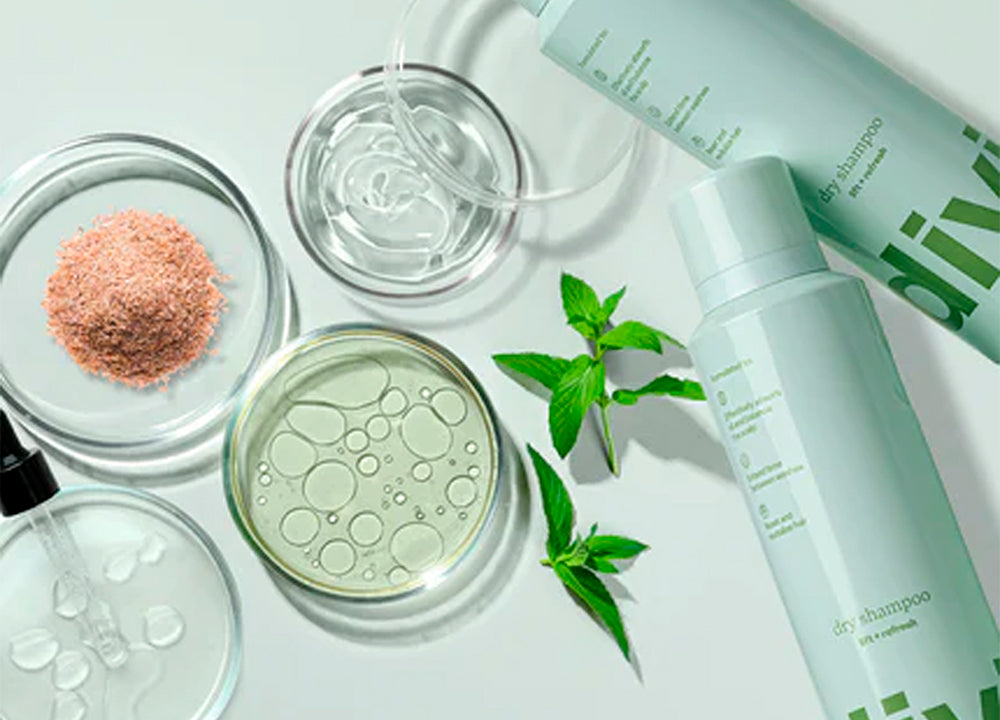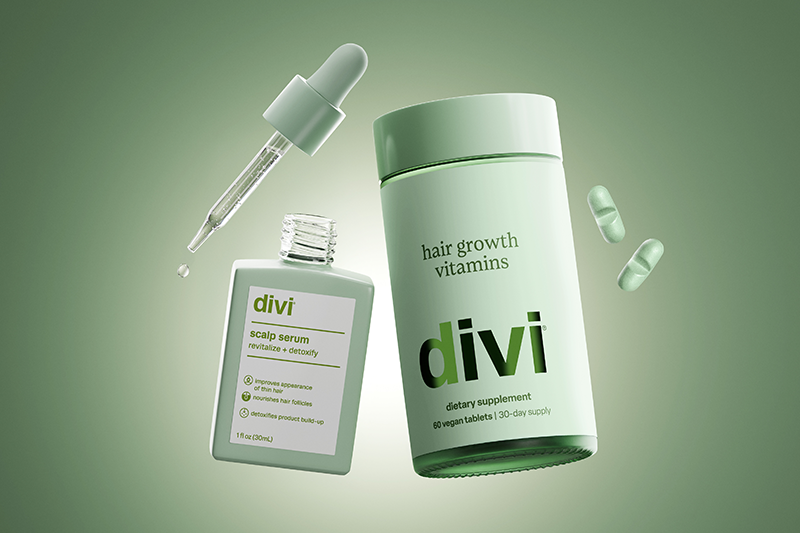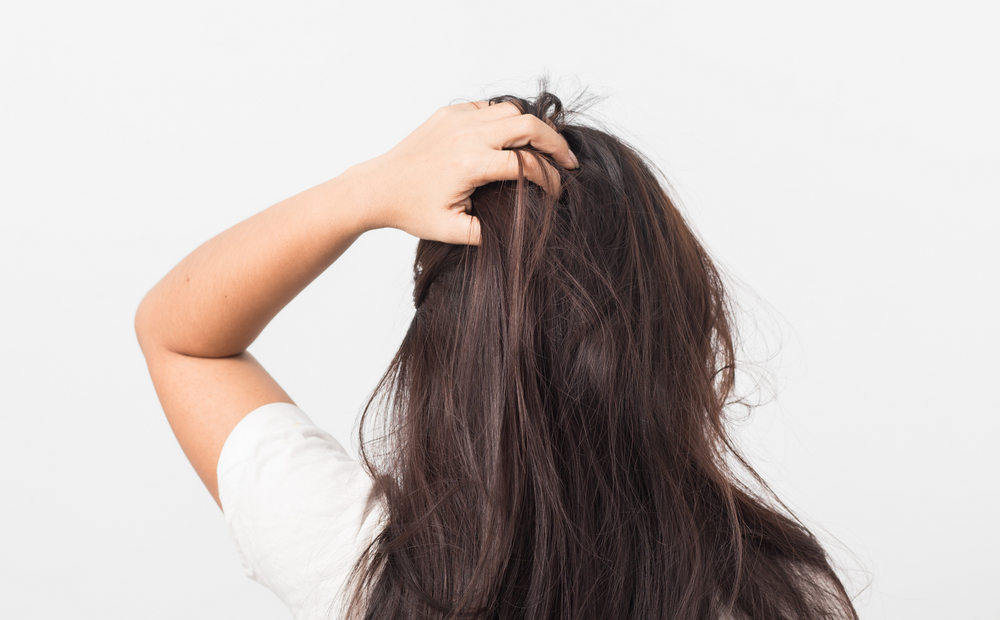If you're left scratching your head, wondering what causes an itching scalp, then our team at Divi will provide answers regarding scalp pruritus and the best way to treat it.
What are the Symptoms of an Itchy Scalp?
An itching scalp is often considered to be a symptom of a variety of different conditions, but along with an itchy scalp, you could also experience other symptoms, such as:
- Bald patches
- Dry skin on the scalp
- Scabs on the scalp
- Pus-filled scalp sores
- Scalp inflammation
- Scaly patches on the scalp
- Swelling of the scalp
Common Causes of An Itching Scalp

Seborrheic dermatitis
Seborrheic dermatitis is a skin condition that causes dandruff, scaly patches and redness on the scalp. While modern medicine has been unable to find the exact cause of seborrheic dermatitis, two main factors contribute to this condition.
One of these factors is the overproduction of oil, as an oily scalp can cause your skin to become red, greasy and irritated. The overproduction of oil can also be related to hormone production.
The other factor associated with seborrheic dermatitis is a type of yeast in the skin's oil, Malassezia globosa. Malassezia globosa can occasionally multiply more than it normally should, which causes an inflammatory response that triggers an increase in oil production. As mentioned above, excessive oil on the skin can cause seborrheic dermatitis.
Seborrheic dermatitis on the scalp can cause symptoms ranging from mild to severe dandruff and an intensely itchy scalp.
Atopic Dermatitis
Atopic dermatitis is the most common form of eczema, which causes your skin to itch, and leaves red blotches often on the face, legs and arms. It can occur almost anywhere on the body, but it often appears on the scalp. Some other symptoms of atopic dermatitis include dry, scaly skin, a rash that swells and then oozes clear fluid, and painful skin cracks that sometimes bleed.
Atopic dermatitis is often found in young children but can affect anyone of any age. Unfortunately, doctors aren't sure what explicitly causes eczema, although genetic factors may play a role. Environmental chemicals can cause flare-ups of atopic dermatitis.
Some of the triggers include:
- Strong shampoo, soap or detergent
- Scratchy clothing fabric
- Tobacco smoke
- Animal dander
- Dry air
- Pollen and mold
Head Lice
Head lice are tiny, blood-sucking insects that live in hair and feed on the scalp. Head lice are contagious, and you can contract them by coming into close proximity with a contaminated item or someone who has lice.
The symptoms of head lice include an itchy scalp, the feeling of something crawling on your scalp, and sores due to scratching. You can also ask someone or a physician to check your hair, as head lice are easily visible on the scalp.
Contact Dermatitis
Contact dermatitis can cause your scalp to itch and occurs when your body experiences an adverse reaction to certain chemicals. There are three categories of contact dermatitis: allergic contact dermatitis, irritant contact dermatitis and photocontact dermatitis.
Allergic contact dermatitis is caused by an allergic reaction to certain chemicals, while irritant contact dermatitis occurs when the skin comes in contact with toxic material. Photocontact dermatitis is much less common, as it only occurs when the ingredients of a product make your skin sensitive to the sun, which can lead to UV exposure irritating the skin.
Allergic Contact Dermatitis
The symptoms of allergic contact dermatitis include:
- Hives
- Skin redness
- Intense itching
- Burning sensation
- Dry, flaky or scaly skin
- Swelling
- Weeping blisters
You may experience allergic contact dermatitis if you have any allergic reactions to:
- Poison ivy, poison oak and some other plants
- Latex
- Gold or nickel jewelry
- Chemicals in skin care products, shampoos or detergents
Irritant Contact Dermatitis
The symptoms of irritant contact dermatitis include:
- Sores that become crusts
- Swelling
- Blistering
- Extremely dry skin that leads to cracking
- "Tight" or "stiff" feeling skin
Some of the toxic materials capable of causing irritant contact dermatitis include:
- Bleach
- Battery acid
- Shampoos, detergents and skin care products
- Kerosene
- Pepper spray
Scalp Psoriasis
Psoriasis affects the skin and is thought to be caused by problems with the immune system. Scalp psoriasis causes cells to build up on the surface of your scalp, which in turn causes itchy, scaly rashes to form. They appear as pink or red rashes on light skin tones and dark brown or purple rashes on darker skin tones.
Some symptoms of scalp psoriasis include a dry scalp, raised red rashes on the skin, white or silver "scales," an itching or burning sensation, and skin flaking that looks like dandruff.
Tinea Capitis
Tinea capitis is more commonly known as ringworm, a fungal skin infection that can occur on the scalp. While the condition is called ringworm, it is not caused by an actual worm and instead gets its name from an infection in the shape of a ring and looking vaguely like a worm.
The word “ringworm” describes a ringworm infection on any other part of the body, while tinea capitis refers explicitly to a ringworm infection on the scalp.
The symptoms of tinea capitis are:
- Itching
- Raised itchy patches on the skin that are red, brown or gray
- Hair loss
- An itchy patch of skin in the shape of a ring
Commonly Asked Questions About Itchy Scalps
Can Stress Cause an Itchy Scalp?
Intense stress levels can trigger a flare-up of itchy scalp if you are already prone to seborrheic dermatitis.
What Vitamin Deficiencies Can Cause an Itchy Scalp?
If you have low levels of Vitamin B2, B6, and B3 and zinc, you could end up experiencing an itchy scalp or other skin issues.
Do Hormonal Changes Cause an Itchy Scalp?
Hormonal changes can cause scalp itchiness, but this is more prevalent in women during their menstrual cycle and menopause. This is due to estrogen being lower during these periods and linked to collagen production.
Can an Itchy Scalp Cause Hair Loss?
An itchy scalp can cause hair loss; if people repeatedly scratch an itchy area, they can end up damaging both the skin and hair follicles in the area, which can lead to hair loss. Many of the conditions listed above can also cause hair loss.
Atopic Dermatitis
Atopic dermatitis won't lead to hair loss by itself; however, this condition can make the scalp incredibly itchy, which will cause people to feel the need to scratch their scalps.
If this happens repeatedly, the hair and skin follicles can be damaged, which can cause hair loss temporarily. Thankfully, once your eczema flare-up is over and your scalp is no longer itchy, your hair should grow back normally.
Tinea Capitis
Tinea capitis can make your scalp itch, which can lead to scratching; however, tinea capitis also weakens the hair follicles around the area of the infection. Thankfully, your hair should grow once you treat your tinea capitis.
What Treatment Can You Use for an Itchy Scalp?
If you're looking to promote the general health of your scalp, consider using Divi's Scalp Serum.
Using clean ingredients and effective amino acids in our Scalp Serum promotes scalp health, can reduce itching, and can address some of the symptoms associated with hair loss.
Medical treatment for an itchy scalp depends on the underlying condition causing the symptoms. For example, an eczema flare-up can be treated with a steroid ointment. We recommend visiting your doctor for a diagnosis if your symptoms are severe.
How Can I Avoid Having an Itchy Scalp?
Some of the best ways to avoid an itchy scalp revolve around hygiene. Regularly washing your hair can help remove any build-up of oil and dirt. Divi's Shampoo eliminates build-up, so why not incorporate it into your hair care routine?
It is best to avoid hair care products containing synthetic fragrances and dye, as some of the ingredients used to achieve these effects can cause an allergic reaction, which will cause an itchy scalp! Thankfully, Divi’s Shampoo, Conditioner, and Scalp Serum all contain clean ingredients, so such reactions are rare.
To avoid head lice, you should avoid sharing items that come in contact with hair, like hats, pillows and combs.
Why Scalp Itch is Worse at Night
Your scalp may feel even itchier at night for a few reasons. Firstly, the skin's temperature fluctuates overnight, which can increase the intensity of your itch. Your anti-inflammatory hormones are also less active at night, which can cause your scalp to feel itchier than during the day.
We also experience less sensory input whilst in bed at night, which may also cause you to focus on your itchy scalp more than you usually would, making it feel itchier.
When to See a Dermatologist for an Itchy Scalp
You should consult a physician if your scalp continues to itch for more than a few days and if other symptoms – such as hair loss, a burning sensation and sores – accompany the itching.
Practical Action to Treat an Itchy Scalp
One of the most practical things you can do to lessen the symptoms of an itchy scalp is to find effective hair care products. Sensitive scalps need clean products made from clean ingredients – and without any harsh chemicals. Divi’s Scalp Serum nourishes the scalp, calms irritation, and helps hydrate to keep the scalp moisturized. Divi’s proprietary formula has been shown to target the root causes of hair and scalp health, helping diminish the symptoms of itchy scalp conditions. Order your bottle of Divi’s Scalp Serum today!




































 Get Started Kit
Get Started Kit
 Scalp Serum
Scalp Serum
 Scalp Reset Shampoo
Scalp Reset Shampoo
 Best Sellers Bundle
Best Sellers Bundle
 Weekly Reset Duo
Weekly Reset Duo
 Dry Shampoo
Dry Shampoo
 Hair Growth Vitamins
Hair Growth Vitamins
 Root Touch Up
Root Touch Up
 Strand Plumping Styling Cream
Strand Plumping Styling Cream
 Root Reset Duo
Root Reset Duo
 3-in-1 Leave-In Conditioner
3-in-1 Leave-In Conditioner
 Air Dry Cream
Air Dry Cream
 Wash Day Essentials
Wash Day Essentials
 Frizz-Fighting Trio
Frizz-Fighting Trio
 Home & Away Dry Shampoo Bundle
Home & Away Dry Shampoo Bundle
 Volumizing Shampoo & Conditioner
Volumizing Shampoo & Conditioner
 Jumbo Volumizing Shampoo & Conditioner
Jumbo Volumizing Shampoo & Conditioner
 Volumizing Starter Bundle
Volumizing Starter Bundle
 Major Volume Bundle
Major Volume Bundle
 Volume Rescue Trio
Volume Rescue Trio
 Hydrating Shampoo & Conditioner
Hydrating Shampoo & Conditioner
 Whipped Repair Treatment Mask
Whipped Repair Treatment Mask
 Hydrating Starter Bundle
Hydrating Starter Bundle
 Hydration Heroes
Hydration Heroes
 Travel-Sized Volume Duo
Travel-Sized Volume Duo
 Travel-Sized Hydrating Duo
Travel-Sized Hydrating Duo
 Divi's Discovery Set
Divi's Discovery Set
